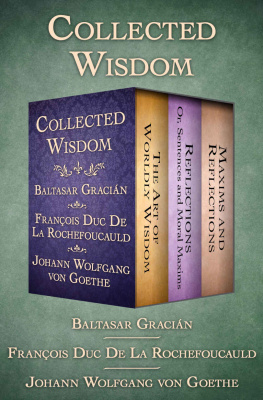ABOUT THE AUTHOR
T. Byram Karasu, M.D., is the Silverman Professor and University Chairman of the Department of Psychiatry and Behavioral Sciences at Albert Einstein College of Medicine/Montefiore Medical Center, and the editor-in-chief of the
American Journal of Psychotherapy. Dr. Karasu chaired the American Psychiatric Association's Commission on Psychiatric Therapies, which produced a critical review of all practiced psychological therapies in the United States. He is the author or editor of nineteen books, including two novels,
Of God and Madness and
Gotham Chronicles: The Culture of Sociopathy; a book of poetry,
Rags of My Soul; and two best sellers,
The Art of Serenity and
The Spirit of Happiness. Dr. Karasu is a scholar, renowned clinician, teacher, and lecturer, and the recipient of numerous awards.
ACKNOWLEDGMENTS
Gratitude Is Akin To Love ROWMAN & LITTLEFIELD PUBLISHERS, INC.
ACKNOWLEDGMENTS
Gratitude Is Akin To Love ROWMAN & LITTLEFIELD PUBLISHERS, INC.
Jonathan Sisk
Senior Executive Editor Elaine McGarraugh
Production Editor Darcy Evans
Assistant Editor, Acquisitions Andrea Reider
Typesetter & Text Designer MY PERSONAL STAFF
Hilda L. Cuesta
Josephine Costa MY WIFE
Sylvia R. Karasu, M.D.
L'ide & Literary Editor
I
SELF
From Nowhere to Here
A person's highest psychological priority is "to gain a coherent state of mind"1to be relatively "well-glued." This coherence is a spectrum. That is to say, there is no such thing as "normal." We all suffer from a garden variety of neuroses. Similarly, "abnormality" is defined by the manifestations of a person's "unglued mind," or having the predisposition to become unglued under certain conditionsgood or bad. Stability of the mind, however, does not have an end product.
It can always be further crystallized and refined. Or, as frequently occurs, we allow the mind to unfold into itself, and bring ourselves into a subjective impasse. The normal doesn't mean you.  There are no psychological supermodels.
There are no psychological supermodels.  The narcissist nourishes himself by self-reference.
The narcissist nourishes himself by self-reference.  Don't let your doubts rule your life, but make sure that they temper it.
Don't let your doubts rule your life, but make sure that they temper it.  If you choose the well-beaten path, you'll be safe; if you choose the less-beaten path, you'll be interesting.
If you choose the well-beaten path, you'll be safe; if you choose the less-beaten path, you'll be interesting.  If you fear your neediness, you'll settle for less.
If you fear your neediness, you'll settle for less.  Yes, cry and laugh, yell, but not too much; "emotional incontinence" is odorous.
Yes, cry and laugh, yell, but not too much; "emotional incontinence" is odorous.  Ambivalence paralyzes the guilty.
Ambivalence paralyzes the guilty.  Conscience is something that tames instincts.
Conscience is something that tames instincts.  To use sincerity as a technique is the ultimate insincerity.
To use sincerity as a technique is the ultimate insincerity.  The survival instinct is the source of ultimate self-discipline.
The survival instinct is the source of ultimate self-discipline.  Mind transcends what can be measuredtherefore, it has no norm.
Mind transcends what can be measuredtherefore, it has no norm.  Ambivalence about being worthy of one's ambition is the source of duplicity.
Ambivalence about being worthy of one's ambition is the source of duplicity.  Complacency of self is a source of failure in maturation.
Complacency of self is a source of failure in maturation.  You are not the only one; "deep down everyone is quite superficial."2
You are not the only one; "deep down everyone is quite superficial."2  Pretending to be real is worse than being false.
Pretending to be real is worse than being false.  One feels better by feeling worse.
One feels better by feeling worse.  Pace of neurotics: Each person has a unique, subjective timetable for growth.
Pace of neurotics: Each person has a unique, subjective timetable for growth.  Few get tired of self-understanding.
Few get tired of self-understanding.  The only failure in life is "the failure of personal growth."
The only failure in life is "the failure of personal growth."  Adulthood is verbal and emotional self-continence.
Adulthood is verbal and emotional self-continence.  The principles of mind are the same.
The principles of mind are the same.  The essentials of our unconscious are collective: they allow only minor variations for each individual.
The essentials of our unconscious are collective: they allow only minor variations for each individual.  Every mind has its own predetermined frameworkits bias.
Every mind has its own predetermined frameworkits bias.  "Wizards of Id" lack phylogenetic self-knowledge.
"Wizards of Id" lack phylogenetic self-knowledge.  We all live in our own unarticulatable psychological bubble.
We all live in our own unarticulatable psychological bubble.  Microanalyses of the mind bring subjective impasses.
Microanalyses of the mind bring subjective impasses.  Experience is the prisoner of language.
Experience is the prisoner of language.  "To hatch from the blissful mother-infant state"3 is the first step to adulthood.
"To hatch from the blissful mother-infant state"3 is the first step to adulthood.  While growing up, don't neglect growing down.
While growing up, don't neglect growing down.  While growing up, don't neglect growing down.
While growing up, don't neglect growing down.
You are as tall and strong as your roots.  The "self" that you find at the mountain top is "the same self you took up there."4
The "self" that you find at the mountain top is "the same self you took up there."4  The human dilemma is both unique and universal.
The human dilemma is both unique and universal.  The only safe transparency is self-transparency.
The only safe transparency is self-transparency.  The mind best organizes itself not around its visible disorder, but around its invisible order, relying not on what is there, but on what is not there.
The mind best organizes itself not around its visible disorder, but around its invisible order, relying not on what is there, but on what is not there.  Behind the question, "What do I want?" is the larger question, "Who am I?"or even, "Am I?"
Behind the question, "What do I want?" is the larger question, "Who am I?"or even, "Am I?"  You can look forward with joy if your look backward offers no shame or guilt.
You can look forward with joy if your look backward offers no shame or guilt.  Night dreams and daydreams are "Janus-faced"; they are fallacious but also telling.
Night dreams and daydreams are "Janus-faced"; they are fallacious but also telling.











 There are no psychological supermodels.
There are no psychological supermodels.